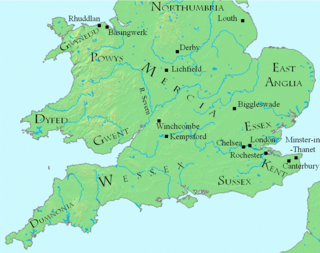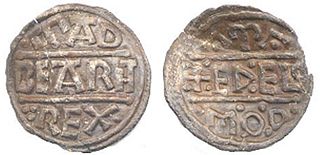Related Research Articles
The 760s decade ran from January 1, 760, to December 31, 769.

Year 762 (DCCLXII) was a common year starting on Friday of the Julian calendar, the 762nd year of the Common Era (CE) and Anno Domini (AD) designations, the 762nd year of the 1st millennium, the 62nd year of the 8th century, and the 3rd year of the 760s decade. The denomination 762 for this year has been used since the early medieval period, when the Anno Domini calendar era became the prevalent method in Europe for naming years.

Year 798 (DCCXCVIII) was a common year starting on Monday of the Julian calendar, the 798th year of the Common Era (CE) and Anno Domini (AD) designations, the 798th year of the 1st millennium, the 98th year of the 8th century, and the 9th year of the 790s decade. The denomination 798 for this year has been used since the early medieval period, when the Anno Domini calendar era became the prevalent method in Europe for naming years.

Offa was King of Mercia, a kingdom of Anglo-Saxon England, from 757 until his death. The son of Thingfrith and a descendant of Eowa, Offa came to the throne after a period of civil war following the assassination of Æthelbald. Offa defeated the other claimant, Beornred. In the early years of Offa's reign, it is likely that he consolidated his control of Midland peoples such as the Hwicce and the Magonsæte. Taking advantage of instability in the kingdom of Kent to establish himself as overlord, Offa also controlled Sussex by 771, though his authority did not remain unchallenged in either territory. In the 780s he extended Mercian Supremacy over most of southern England, allying with Beorhtric of Wessex, who married Offa's daughter Eadburh, and regained complete control of the southeast. He also became the overlord of East Anglia and had King Æthelberht II of East Anglia beheaded in 794, perhaps for rebelling against him.

Coenwulf was the King of Mercia from December 796 until his death in 821. He was a descendant of King Pybba, who ruled Mercia in the early 7th century. He succeeded Ecgfrith, the son of Offa; Ecgfrith only reigned for five months, and Coenwulf ascended the throne in the same year that Offa died. In the early years of Coenwulf's reign he had to deal with a revolt in Kent, which had been under Offa's control. Eadberht Præn returned from exile in Francia to claim the Kentish throne, and Coenwulf was forced to wait for papal support before he could intervene. When Pope Leo III agreed to anathematise Eadberht, Coenwulf invaded and retook the kingdom; Eadberht was taken prisoner, was blinded, and had his hands cut off. Coenwulf also appears to have lost control of the kingdom of East Anglia during the early part of his reign, as an independent coinage appears under King Eadwald. Coenwulf's coinage reappears in 805, indicating that the kingdom was again under Mercian control. Several campaigns of Coenwulf's against the Welsh are recorded, but only one conflict with Northumbria, in 801, though it is likely that Coenwulf continued to support the opponents of the Northumbrian king Eardwulf.

Eadberht III Præn was the King of Kent from 796 to 798. His brief reign was the result of a rebellion against the hegemony of Mercia, and it marked the last time that Kent existed as an independent kingdom.
Æthelbert II was king of Kent. Upon the death of his father Wihtred, the kingdom was ruled by his three sons, Æthelbert II, Eadberht I and Alric. Æthelbert seems to have outlived both of his brothers and later reigned jointly with his nephew Eardwulf. He died in 762, according to the Anglo-Saxon Chronicle. He seems to have left a son, Eadberht II.
Eadberht is an Anglo-Saxon male name. It may refer to:
Eadberht I was king of Kent from 725 to 748. After his father Wihtred of Kent died, he inherited the kingdom of Kent along with his two brothers Æðelberht II and Alric. Æðelberht II seems to have been the eldest and dominant brother. Eadberht I died in 748, according to the Anglo-Saxon Chronicle. He left a son, Eardwulf, who succeeded as king jointly with his uncle.
Eadberht of Selsey was an abbot of Selsey Abbey, later promoted to become the first Bishop of Selsey. He was consecrated sometime between 709 and 716, and died between 716 and 731. Wilfrid has occasionally been regarded as a previous bishop of the South Saxons, but this is an insertion of his name into the episcopal lists by later medieval writers, and Wilfrid was not considered the bishop during his lifetime or Bede's.

Æthelhard was a Bishop of Winchester then an Archbishop of Canterbury in medieval England. Appointed by King Offa of Mercia, Æthelhard had difficulties with both the Kentish monarchs and with a rival archiepiscopate in southern England, and was deposed around 796 by King Eadberht III Præn of Kent. By 803, Æthelhard, along with the Mercian King Coenwulf, had secured the demotion of the rival archbishopric, once more making Canterbury the only archbishopric south of the Humber in Britain. Æthelhard died in 805, and was considered a saint until his cult was suppressed after the Norman Conquest in 1066.
Eardwulf was King of Kent, jointly with Æðelberht II.

Æthelwald Moll was King of Northumbria, the historic petty kingdom of Angles in medieval England, from 759 to 765. He seized power after the murder of Oswulf son of Eadberht; his ancestry and connection to the royal family of Northumbria is unknown. Æthelwald faced at least one rebellion, led by Oswine, perhaps a brother of Oswulf. In 765 a Witenagemot of Northumbrian notables deposed Æthelwald and replaced him with Alhred, a kinsman of his predecessor. After his removal from the throne Æthelwald became a monk, perhaps involuntarily.

Æthelred, was the king of Northumbria from 774 to 779 and again from 790 until he was murdered in 796. He was the son of Æthelwald Moll and Æthelthryth and possibly became king while still a child after Alhred was deposed.
Alric was a king of the Saxon kingdom of Kent, jointly with Æðelberht II and Eadberht I.
Eadberht II was King of Kent, jointly with Sigered. He was apparently the son of Æðelberht II.

Eanmund (c.764–?) was a king of Kent, jointly with or in succession to Sigered of Kent.
Events from the 8th century in England.
References
- Sigered 2 at Prosopography of Anglo-Saxon England
- Lee, Sidney, ed. (1897). . Dictionary of National Biography . Vol. 52. London: Smith, Elder & Co.